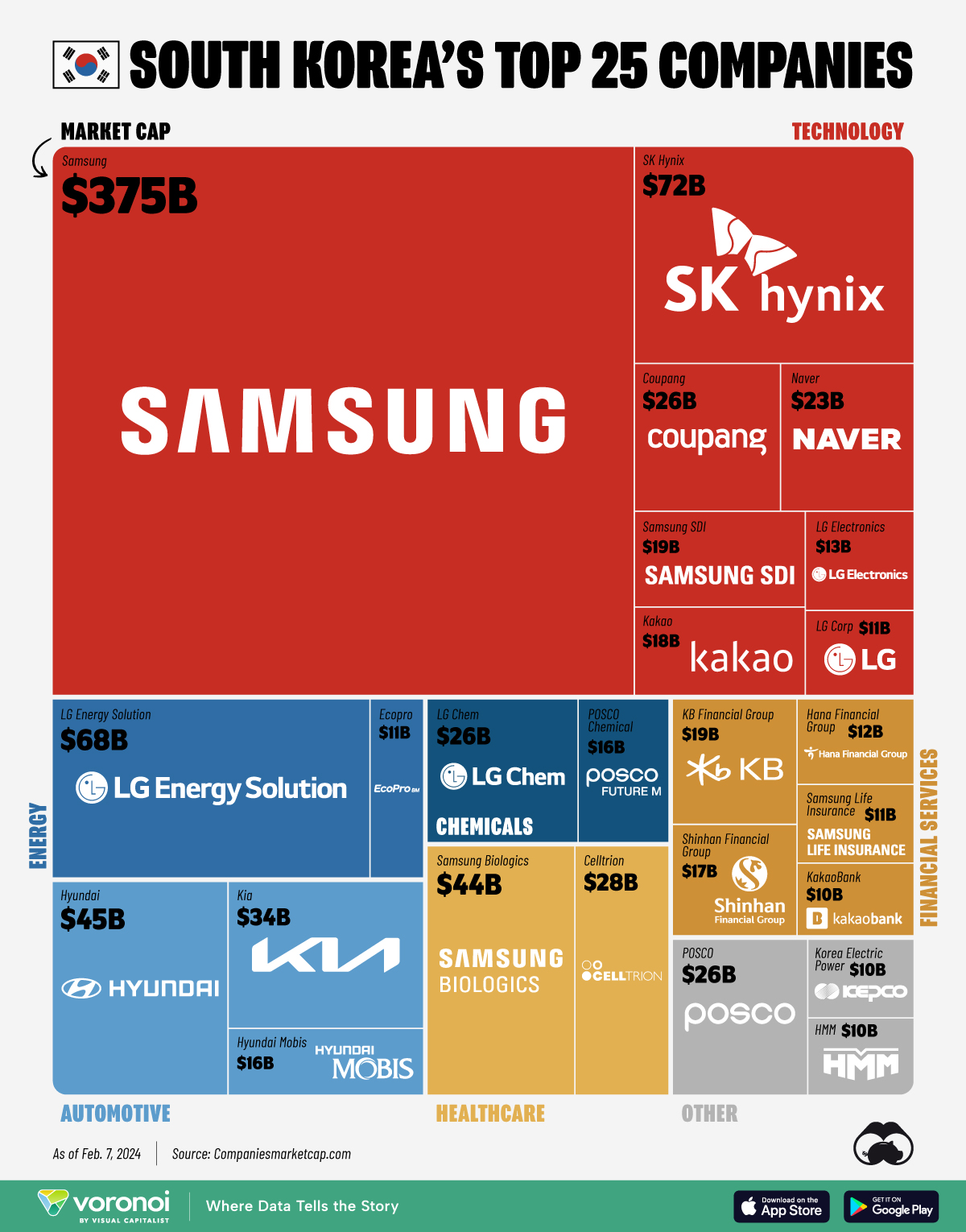![]()
See this visualization first on the Voronoi app.

South Korea’s Largest Companies by Market Cap
This was originally posted on our Voronoi app. Download the app for free on iOS or Android and discover incredible data-driven charts from a variety of trusted sources.
In the two decades after the Korean war, rapid industrialization, dubbed the “Miracle on the Han River” transformed South Korea into an economic powerhouse.
Several major South Korean companies—now household names—were founded during this period, and are now some of the most valuable companies in the country and around the globe.
We visualize the top 25 South Korean companies by market capitalization, based on February 7, 2024 prices in USD, sourced from CompaniesMarketCap.com.
South Korea’s Top 25 Companies
South Korea’s most valuable company by a country mile is Samsung with a market cap past $375 billion, bigger than the economy of Qatar. Samsung is most popularly known for their mobile phones, but is also a major appliance maker: washing machines, air conditioners, and televisions.
Its lucrative semiconductor business supplies chips to some notable clients: Nvidia, Qualcomm, and IBM.
With its 2023 revenue close to $197 billion, Samsung is the second-largest electronics company (after Apple) in the world.
| Rank | Name | Industry | Market Capitalization |
|---|---|---|---|
| 1 | Samsung | Technology | $375B |
| 2 | SK Hynix | Technology | $72B |
| 3 | LG Energy Solution | Energy | $68B |
| 4 | Hyundai | Automotive | $45B |
| 5 | Samsung Biologics | Healthcare | $44B |
| 6 | Kia | Automotive | $34B |
| 7 | Celltrion | Healthcare | $28B |
| 8 | LG Chem | Chemicals | $26B |
| 9 | POSCO | Other | $26B |
| 10 | Coupang | Technology | $26B |
| 11 | Naver | Technology | $23B |
| 12 | Samsung SDI | Technology | $19B |
| 13 | KB Financial Group | Financial Services | $19B |
| 14 | Kakao | Technology | $18B |
| 15 | Shinhan Financial Group | Financial Services | $17B |
| 16 | POSCO Chemical | Chemicals | $16B |
| 17 | Hyundai Mobis | Automotive | $16B |
| 18 | LG Electronics | Technology | $13B |
| 19 | Hana Financial Group | Financial Services | $12B |
| 20 | Ecopro | Energy | $11B |
| 21 | Samsung Life Insurance | Financial Services | $11B |
| 22 | LG Corp | Technology | $11B |
| 23 | KakaoBank | Financial Services | $10B |
| 24 | Korea Electric Power | Other | $10B |
| 25 | HMM | Other | $10B |
In fact there are several other Samsung names in this graphic. This includes Samsung Biologics (the biotech division of Samsung), Samsung SDI (electronics and battery manufacturing), and Samsung Life Insurance (South Korea’s largest insurance company).
Meanwhile, the LG Group (formerly known as Lucky-Goldstar) is another massive Korean conglomerate (also known as a “chaebol”). This includes businesses in chemicals (LG Chem) and batteries (LG Energy Solution).
Korean carmakers Hyundai and Kia, also feature in the top 25 most valuable Korean companies.
A Brief Note on South Korea’s Chaebol System
Chaebols (family-owned conglomerates) have played a crucial role in South Korea’s rapid economic rise from the 1960s onwards.
They benefited from government support in the postwar reconstruction period, and with access to credit, allowing them to invest heavily in key industries like shipbuilding, electronics, and automobiles. This contributed significantly to the country’s export-oriented growth model.
At the same time, the sheer size and influence of chaebols can fan monopolistic tendencies in the economy, stifling competition in certain sectors, hindering the growth of smaller businesses and potentially leading to inefficiencies.
Critics argue that the chaebol system can exacerbate income inequality in South Korea, with wealth concentrated among founding families and top executives.
The concept of large family-owned conglomerates is not entirely specific to South Korea. During Japanese colonial rule (1910-1945) in South Korea, similar powerful family-controlled businesses called zaibatsu existed in Japan. The structure and influence of these zaibatsu may have indirectly influenced the development of chaebols in South Korea.
The post Ranked: South Korea’s Largest Companies by Market Capitalization appeared first on Visual Capitalist.